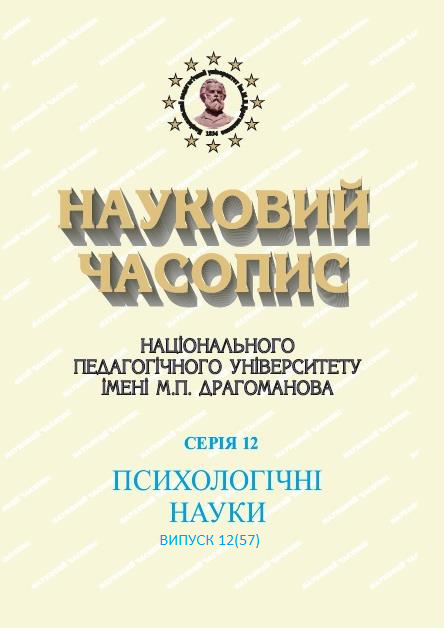PSYCHOLOGICAL FEATURES OF THE DEVELOPMENT OF THE COGNITIVE COMPONENT OF INDEPENDENCE OF MODERN ADOLESCENTS
DOI:
https://doi.org/10.31392/NPU-nc.series12.2020.12(57).03Keywords:
cognitive component, independence, self-regulation, creativity, imagination, intelligence, reflection, teenagerAbstract
The article substantiates the relevance and feasibility of studying the phenomenon of independence of modern adolescents. It is noted that the studied concept is a multicomponent formation, and, therefore, in its structure there are 4 components: cognitive, motivational-value, behavioral and emotional. This article is devoted to the study of the cognitive component of the phenomenon of independence of modern adolescents. The aim of the study is to determine the level of development of the cognitive component through its components – creativity, which characterizes a person's desire to generate new ideas and put them into practice, as well as constantly looking for opportunities for development and reflexivity, thanks to which the adolescent is able to realize the results of their own actions and deeds, summarize and, if necessary, adjust their actions in the right direction. The theoretical part presents an analysis of the main approaches of foreign and domestic scientists to the problem of development of the cognitive component of the phenomenon of independence in modern psychology. The peculiarities of the development of indicators of the cognitive component of creativity of modern adolescents are empirically determined, in particular, the peculiarities of curiosity, imagination, complexity of tasks and risk appetite are studied. The predominance of the average level of imagination, the complexity of the tasks, the propensity to risk, the component of curiosity is in the surveyed adolescents is above average, which is the age characteristic of adolescents. The level of development of reflexivity of modern teenagers is investigated and analyzed. The predominance of a low (which is characterized by difficulties in planning their activities, lack of ability to analyze their own mistakes, inability to use experience in solving difficult situations, difficulties in regulating their own behavior) and medium level of reflexivity (characterized by the ability to plan their actions and their analysis, as well as analysis of other people's actions, but reflexive processes are irregular, and reflexive analysis is superficial). The significance of creativity and reflexivity as indicators of the cognitive component of creativity in the general structure of independence and its development during adolescence is substantiated.
References
- Aliieva, E.Iu. (2017). Psykholohichni chynnyky formuvannia u studentiv zdatnosti do samostiinoho zhyttievoho vyboru [Psychological factors of formation of students' ability to make independent life choices]. Extended abstract of Candidate's thesis. Kyiv [in Ukrainian].
- Karpov, A.V. (2003). Refleksivnost' kak psihicheskoe svojstvo i metodika ee diagnostiki [Reflexivity as a mental property and methods of its diagnosis]. Psihologicheskij zhurnal – Psychological journal, 5, 45–56 [in Russian].
- Kasvinov, S.G. (2013). Sistema Vygotskogo. Obuchenie i razvitie detej i podrostkov [Vygotsky's system. Education and development of children and adolescents]. Har'kov : Rajder [in Russian].
- Kon, I.S. (1992). Psihologija samostojatel'nosti [Psychology of independence]. Pedagogika zdorov'ja – Health pedagogy, 268–273 [in Russian].
- Krajg, G., & Bokum, D. (2005). Psihologija razvitija [Developmental psychology]. Sankt-Peterburg : Piter [in Russian].
- Osnickij, A.K. (2010). Psihologicheskie mehanizmy samostojatel'nosti [Psychological mechanisms of independence]. Moscow : Obninsk: IG–SOCIN [in Russian].
- Tunik, E.E. (2002). Diagnostika lichnostnoy kreativnosti. [Diagnosis of personal creativity]. InP. Fetiskin, V.V. Kozlov & G.M. Manuylov (Eds.), Sotsialno-psihologicheskaya diagnostika razvitiya lichnosti i malyih grupp – Socio-psychological diagnosis of personality development and small groups (p. 59–64). Moscow : Izd-vo Instituta psihoterapii [in Russian].
- Bieri, Р. (2017). Wie wäre es, gebildet zu sein? München/Grünwald : Verlag Komplett Media GmbH.
- Bland, (2013). Children’s literature and learner empowerment: children and teenagers. London : Bloomsbury Academic.
- Drieschner, Е. (2007). Erziehungsziel „Selbstständigkeit“. Grundlagen, Theorien und Probleme eines Leitbildes der Pädagogik. Wiesbaden : GWV Fachverlage GmbH.
- Manske, A. & Scheffelmeier, T. (2015). Werkverträge, Leiharbeit, Solo-Selbstständigkeit: Eine Bestandsaufnahme. Düsseldorf : Wirtschafts- und Sozialwissenschaftliches Institut (WSI).
- Suprinovič, O., Schneck, St. & Kay, R. (2016). Einmal Unternehmer, immer Unternehmer? Selbstständigkeit im Erwerbsverlauf. IfM-Materialien, 248.
- Torsten, Kühlman, M., & Haas, Hans-Dieter (2009). Internationales Risikomanagement: Auslandserfolg durch grenzüberschreitende Netzwerke. München : De Gruyter Oldenbourg.

